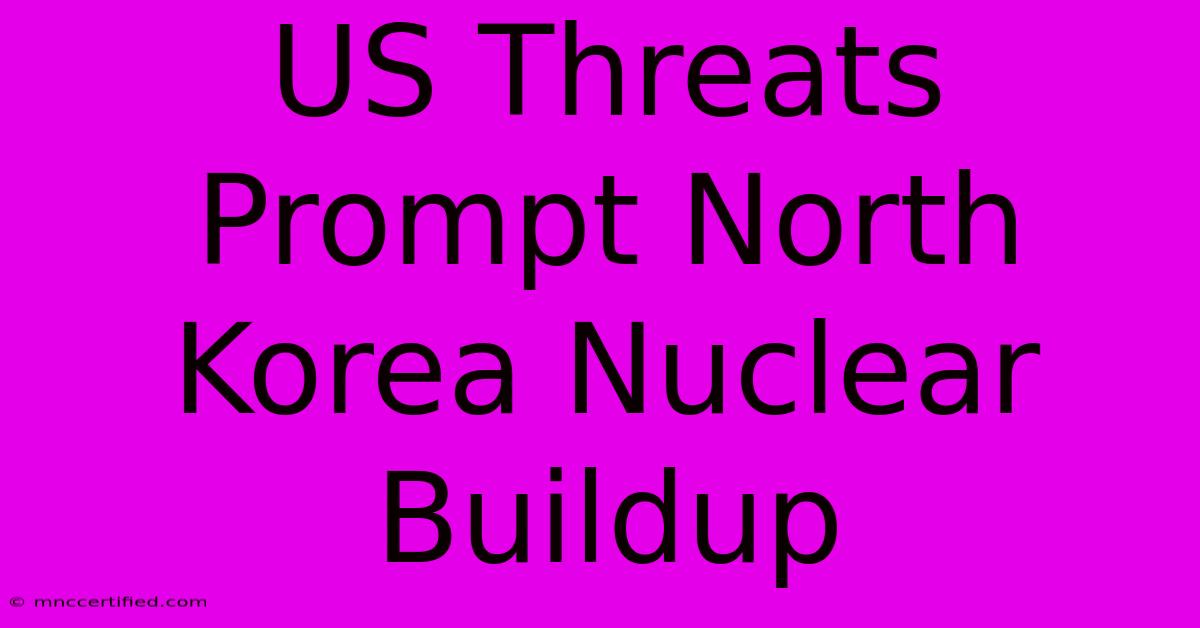US Threats Prompt North Korea Nuclear Buildup

Table of Contents
US Threats Prompt North Korea Nuclear Buildup: A Dangerous Escalation
The escalating tensions on the Korean peninsula are a cause for global concern. North Korea's continued development of its nuclear weapons program, fueled by perceived threats from the United States, presents a significant risk of regional and international instability. This article delves into the complex interplay of factors driving North Korea's nuclear buildup, exploring the historical context, the role of US actions, and the potential consequences of this dangerous escalation.
Historical Context: A Legacy of Conflict
Understanding North Korea's nuclear ambitions requires examining its history. The Korean War (1950-1953) left a legacy of deep mistrust between North Korea and the US. The war's conclusion resulted in a fragile armistice, not a peace treaty, leaving the Korean peninsula technically still at war. This ongoing state of conflict, coupled with decades of sanctions and perceived hostility from the US, has shaped North Korea's security strategy. The country views nuclear weapons as its ultimate deterrent against potential invasion or regime change.
The Role of Sanctions and International Pressure
While international sanctions, largely driven by US policy, aim to curb North Korea's nuclear program, they have arguably had a counterproductive effect. Instead of deterring the regime, sanctions have likely strengthened its resolve, fostering a siege mentality and limiting access to essential goods, further impacting the North Korean population. This has created a vicious cycle where sanctions exacerbate internal hardships, solidifying the regime's grip on power and its commitment to nuclear development.
US Actions and North Korea's Response: A Cycle of Escalation
Many experts argue that certain US actions have inadvertently fueled North Korea's nuclear ambitions. Military exercises near the Korean Peninsula, rhetoric perceived as threatening, and the continued presence of US troops in South Korea are all cited as contributing factors. North Korea views these actions as a direct threat to its sovereignty and national security, justifying its pursuit of nuclear weapons as a necessary safeguard.
The Importance of Diplomatic Engagement
While a strong defense posture is crucial, solely relying on military strength is unlikely to resolve the situation. Experts increasingly advocate for a more nuanced approach involving diplomatic engagement and dialogue. This requires a delicate balance – firmly addressing North Korea's nuclear program while also creating avenues for de-escalation and exploring potential compromises. Ignoring the underlying grievances and solely focusing on pressure tactics risks further destabilizing the region.
The Potential Consequences: Regional and Global Instability
The continued development of North Korea's nuclear arsenal poses serious risks. The possibility of accidental conflict, miscalculation, or even intentional aggression presents a grave threat to regional stability. The proliferation of nuclear weapons technology could have devastating consequences, potentially destabilizing Northeast Asia and triggering a broader arms race. Furthermore, the humanitarian cost of continued tensions cannot be overlooked, with the North Korean population bearing the brunt of sanctions and the ongoing uncertainty.
The Need for a Multifaceted Approach
Addressing the North Korea nuclear issue requires a comprehensive and multifaceted approach. This should include:
- Strengthened diplomatic efforts: Prioritizing dialogue and negotiation to address underlying concerns.
- Targeted sanctions: Focusing on minimizing the impact on the civilian population while maximizing pressure on the regime's weapons program.
- Regional cooperation: Working with regional partners, including China and South Korea, to find a coordinated response.
- Improved humanitarian assistance: Addressing the humanitarian needs of the North Korean population to mitigate the negative consequences of sanctions.
The current situation on the Korean peninsula is precarious. Understanding the historical context, the role of US actions, and the potential consequences is crucial for developing effective strategies to de-escalate tensions and prevent a catastrophic outcome. A combination of diplomatic engagement, targeted sanctions, and regional cooperation is essential to navigate this complex challenge and prevent further escalation. The future stability of the region hinges on a commitment to finding a peaceful resolution.

Thank you for visiting our website wich cover about US Threats Prompt North Korea Nuclear Buildup. We hope the information provided has been useful to you. Feel free to contact us if you have any questions or need further assistance. See you next time and dont miss to bookmark.
Featured Posts
-
Footballer Bentancur Sanction Update
Nov 19, 2024
-
Car Seat Through Health Insurance
Nov 19, 2024
-
Dune Prophecy Review Bracing Sci Fi
Nov 19, 2024
-
Trumps Carr Fcc Chairmanship Outcomes
Nov 19, 2024
-
Time Insurance Agency Punta Gorda
Nov 19, 2024